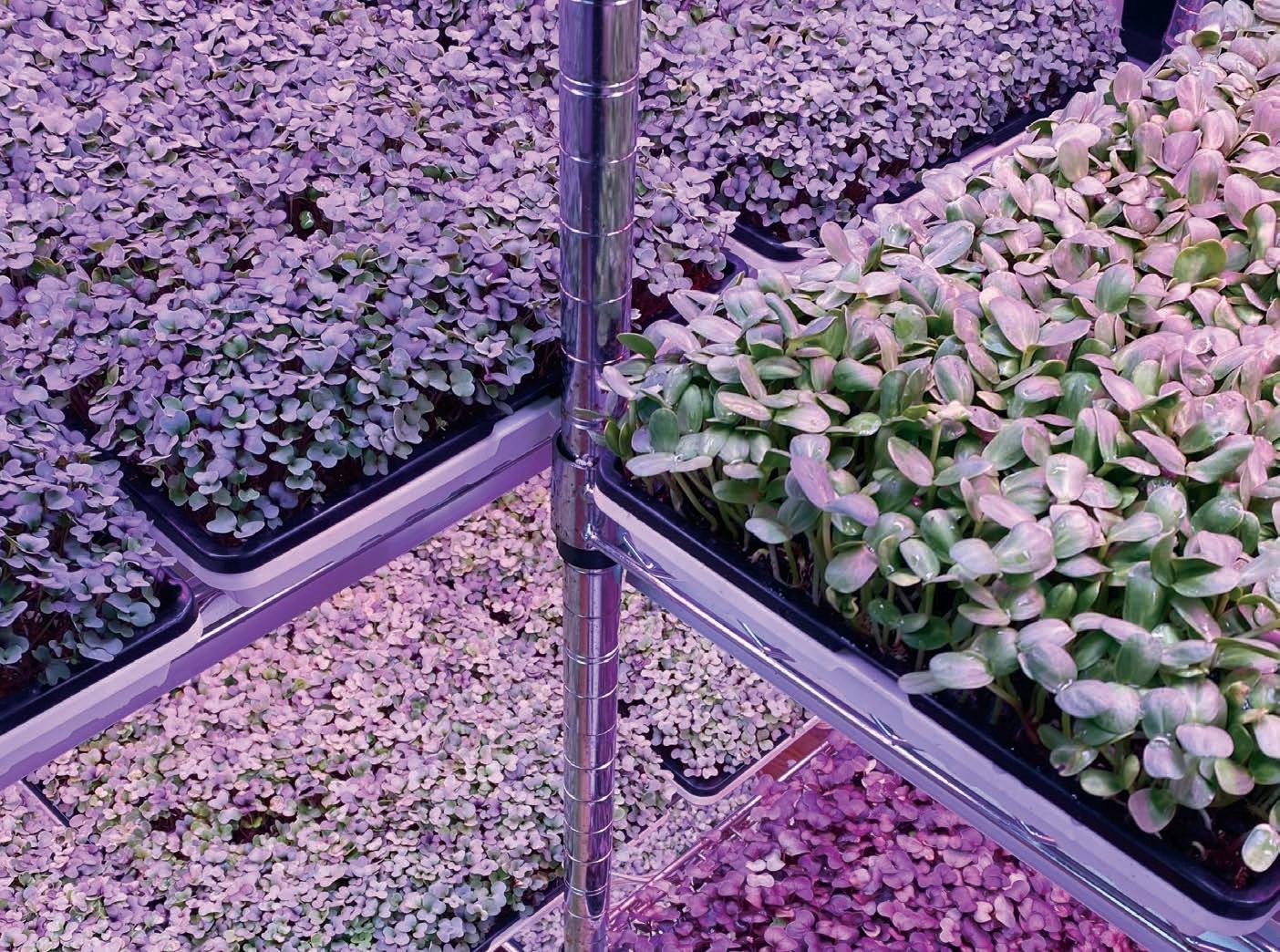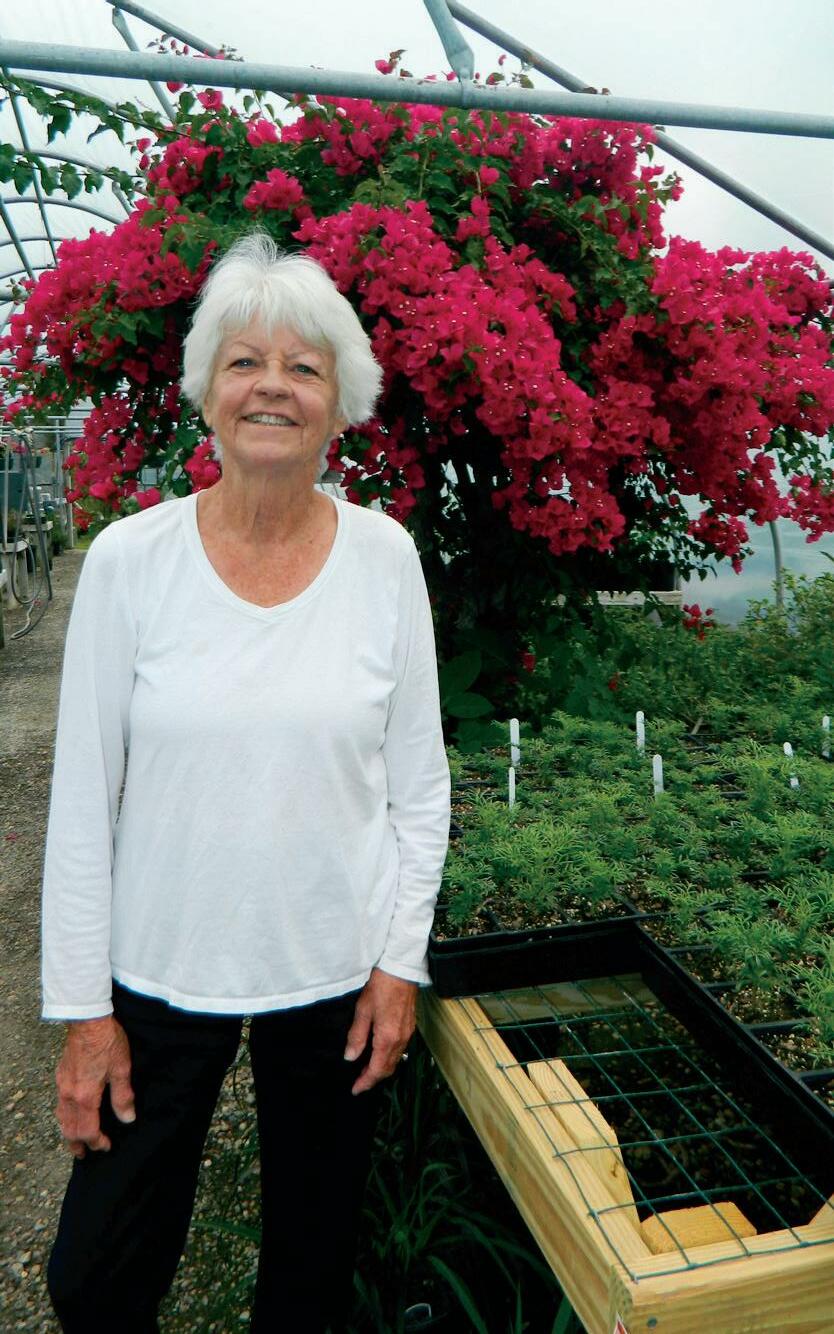
5 minute read
Serene, plant-fi lled nursery worth the drive

packaged and refrigerated for Thursday’s market. Most of the greens have an eightday turnaround, while varieties like basil and cilantro take two to three weeks to reach the microgreen stage.
Advertisement
During the summer, Harrison set up a booth at Secotan Market in Wanchese and at Dowdy Park Farmer’s Market in Nags Head on Thursdays. “It’s my local community,” he said. “It was awesome. I feel more a part of this community than I ever have, going to these markets, having conversation. We pretty much sold out every week. People are so grateful, and honestly, we’re grateful that they want to buy it.”
He sells now at Secotan Market in Wanchese every Saturday morning from 8 am to noon and at Shine On Juicery in Kill Devil Hills. Home delivery is offered year ’round from Manteo to Southern Shores. New this year, customers can opt for a subscription to avoid the weekly hassle of placing an order.
With microgreens, because the plants are young, they have a shorter shelf life and should be consumed within 7-10 days. Because of that, Harrison is focused on local distribution only. “You’re getting it within a day, two days from harvest,” he said.
Aside from the product itself, there’s another thing that Harrison is excited about. When a tropical storm blew through, he ended up with a lot of unsold microgreens. “We took them over to the food pantry. I didn’t know if they’d want them, but they were stoked. Since mid-summer, we’ve donated over 100 boxes to the food pantry. This year we will do a weekly donation. We try to grow a little extra for that,” he said.
In 2021, the urban farm donated 141 small boxes and 187 large boxes of microgreens to the Beach Food Pantry. “This more than doubles our donation in 2020. We look forward to improving on this effort in 2022. By supporting our business, our customers help to support this practice of giving back to our local community and we are so grateful!” Bradley said.
When asked if he plans to expand his crops, Harrison replied, “I’m just focusing on the microgreens for now. Keeping the quality high is more important than conquering the world.”
Bradley agreed: “Quality is very important to him. He’s not going to cut corners. He’s very environmentally conscious.”
One of the ways Harrison Farms cares for the environment is by using compostable containers. “They’re made out of corn and not petroleum, so they’ll break down faster than regular plastic,” Harrison said. Whenever possible, returned containers are reused after being cleaned and sanitized. The national interest in buying local produce, or growing your own food, is increasing. “There’s a movement toward decentralization in agriculture. It’s fun to really be a part of it.”
Large (4 oz.) boxes sell for $12 and the smaller ones (1.5-2 oz. depending on the crop) go for $6. Like many food producers, Harrison Farms had had to raise their prices due to an increased cost for seeds, soil and containers. But Harrison makes sure the boxes are chock full. “We over fill them by 15 percent – we load those boxes,” he said. “There’s a lot more in there than you realize.”
Harrison Farms can be reached online at www.obxmicrogreens.com, via Facebook (Harrison Farms Microgreens), Instagram (Harrison Microgreens), email (harrisonmicrogreens@gmail.com) or by calling 252489-1040.



Courtesy Harrison Microgreens
Elizabeth Bradley plants and prepares microgreens each week.

Learn. Grow. Explore.
There’s a place for everyone in Girl Scouts!
gsccc.org (800)77SCOUT Serving girls K-12


Philip S. Ruckle Jr. photo
Sherry Foreman, the owner of Nature’s Harmony in Manns Harbor, stands near a bougainvillea, a tropical plant that is estimated to be at least 40 years old.
Serene, plant-filled nursery worth the drive
by Philip S. Ruckle Jr.
Sherry Foreman says if you’re looking for a unique gift for someone, Nature’s Harmony in Manns Harbor is the place to get it.
Although in days past Manns Harbor was better known for fishing and boat building, today Foreman’s plant nursery near the end of Shipyard Road is becoming a popular destination for locals and visitors alike.
Following a winding and sometimes lonely road will reward a driver with an almost 11 acre assortment of plant life of so many different colors it could easily rival an artist’s paint palette.
“We’ve been doing this for 30 years because we love it,” says Foreman. “You grow plants because you love it or you wouldn’t do this business.”
Foreman says before the nursery, she and her husband Ron were videographers and crabbers.
“The outboard motorboat died and it was $5,000 to fix it,” she relates. “I said I wanted to greenhouse and Ron said no because that would tie us down the rest of our lives. I said I was going to do it with him or without him.”
Foreman says Ron did build her a greenhouse. Today there are three and, just like he said, they were tied down. But, she added, he loved it until he passed away just as much as she did.
“We built our house ourselves, in our twenties, right here on the property we bought from a person who bought it from my grandmother,” recalls Foreman. “In the early ‘50s she sold 48 acres here for $1,400. We bought back a bit of it at the time. Then my parents gave me 8 acres so now it’s 11 acres of land I played on 70 years ago.”
The transition from crabbing to nursery came in 1995. In the spring, there are about seven employees with a need for more.
“We close a couple of weeks at Christmas,” says Foreman, “but otherwise we’re open year-round. We do slow down in the winter and take a few days off. But somebody’s got to be here to tend to it. We spent a lot of time on the road picking up and delivering plants, since a lot of people would not deliver, so we had to go get them.”
Foreman says she and her staff grow as many plants as they can. What they can’t grow at the nursery, Foreman searches for lower-cost sources so she can keep her prices as low as possible.

Philip S. Ruckle Jr. photo
Miriam Fernindez waters plants in one of three Nature’s Harmony greenhouses at the Manns Harbor nursery.










